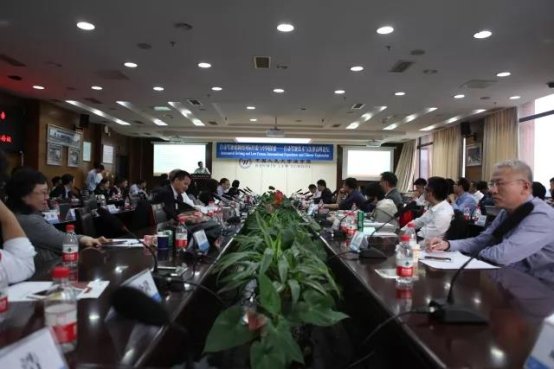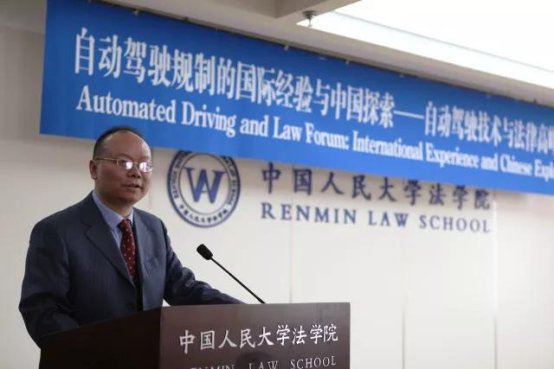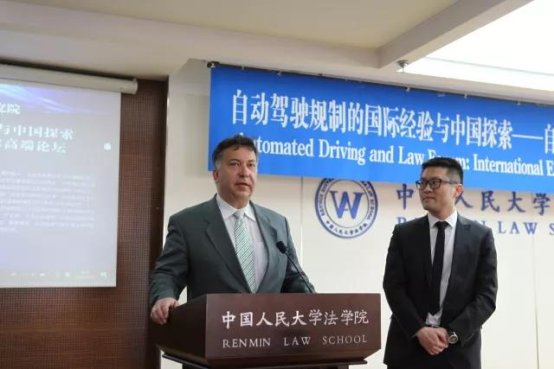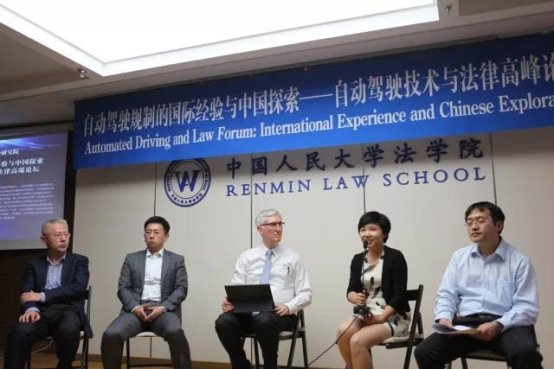Look around the World and Look into the Future----- Automated Driving and Law Forum Successfully held
time:2018-04-05With the rapid development of automated driving technology, the legal regulation of automated driving has become the focus and hot spot of the current legal research and government legislation. Law and Technology Institute of Renmin University of China pays close attention to the development direction, policies and legal trends of the global automated driving industry. On March 31, 2018, we invited Prof. Eric Hilgendorf, well-known expert in the field of automated driving law in Germany, Professor of Law School, Wuerzburg University, director of the professional committee of "Autonomous Learning System and Law" of the Federal Ministry of Education and Research, and director of the German Automated driving Ethics Committee, as well as experts and leaders from academia, industry, legislative and regulatory departments, held a high-end forum on "Automated driving Technology and Law". The conference was hosted by Law and Technology Institute of Law School, Renmin University of China and co-organized by the Internet Law Research Center of theChina Academy of Information and Communications Technology.
The opening ceremony was presided over by Zhang Jiyu, Associate Professor, executive director of Law and Technology Institute, Law School, Renmin University of China. Professor Wang Yi, Dean of Law School of Renmin University of China, vice president and Secretary General of Civil Law Research Association of China law society, and Prof. Eric Hilgendorf delivered speeches respectively.

Dean Wang Yi pointed out that automated driving was the core issue of concern and discussion in the civil law academic circles in the process of editing the infringement liability of the Civil Code. The discussion in this forum will also have a corresponding impact on the compilation of the Civil Code of the People's Republic of China.

In his speech, Professor Eric Hilgendorf pointed out that the international commonality of technology brings about the international commonality of legal issues caused by technology. He set up the Robotics Law Research Center at the Law School, Wurzburg University in Germany in 2010 and led the center to participate in numerous research projects supported by the German federal government and the European Union. Since 2013, as an important member of the Legal Advisory Committee of German Federal Ministry of Transport, he has provided legal advice to the German Federal Ministry of Transport on theGermanRoad Traffic Law. He expressed his willingness to share his experience in the revision of German automated driving law and his experience in the research on the paradox of automated driving in this forum, and hoped to gain new knowledge in the exchange with his Chinese counterparts.

The conference stage was divided into four parts. The first and second parts were held in the morning, and the third and fourth parts were held in the afternoon.
The first part - the German experience of automated driving regulation
This part was presided over by Associate Professor Wang Ying, Associate Dean of Law and Technology Institute, Law School, Renmin University of China.
Professor Eric Hilgendorf introduced the background and influence of the amendment of German Road Traffic Lawfrom four aspects: access law and behavior law, civil legal liability, criminal liability and data protection. Professor Hilgendorf pointed out in the report that there were few technological developments such as automated driving that attract the public's attention. Although the amendment of the Road Traffic Lawwas full of controversy, the German Federal Minister of Transport evaluated the law as "the most modern road traffic law in the world". The regulation adheres to the spirit of "automatic and online driving strategy - providing first-class suppliers, maintaining market leadership and introducing operation rules" determined by the German government, with the aim of setting the legal basis for highly and fully automated driving and ensure the stability of the law.
The second part - China's exploration of automated driving: technology, standards and policies
This session was presided over by Associate Professor Zhang Jiyu. Dai Xiaohui, vice president and Executive Deputy Secretary General of Communication Standardization Association and former deputy inspector of science and Technology Department of Ministry of industry and information technology, Liang Zhixiang, vice president and general counsel of Baidu and Deng Zhidong, Professor of the State Key Laboratory of intelligent technology and system of Tsinghua University and director of the intelligent automation professional committee of China Automation Society delivered speeches respectively.
Under the chairmanship of Associate Professor Zhang Jiyu, Luo Lifan, General Manager of the Government and Legal Affairs of Microsoft Asia Pacific R&D Group, Liu Kai, Vice President of ofo, and Han Ying, Director of Policy Affairs, Information Industry Institution of the United States, commented and discussed the keynote speech.
The third part: legal thinking and Chinese scheme of automated driving
This session was hosted by Associate Professor Ding Xiaodong, Associate Dean of Law and Technology Institute, Law School, Renmin University of China. Professor Yang Lixin, vice president of China Civil Law Research Association and director of civil and commercial law science research center of Renmin University of China, failed to attend the forum for some reason, so he wrote a paper for the forum and entrusted his doctoral students to give a speech. In addition, Fan Wen, a researcher at the Chinese Academy of Social Sciences, Wang Ying, deputy dean of Law and Technology Institute, Law School, Renmin University of China, and Zhang Zhuting, a professor at the Cadre Management School of the Ministry of Communications, also delivered keynote speeches at this session.
Wang Xuemei, editor in chief of the editorial department of Global Legal Review, Law School of Chinese Academy of Social Sciences, Che Hao, Associate Professor of Law School, Peking University and Wang Gang, Associate Professor of Law School, Tsinghua University respectively commented.
The fourth part- the specific construction of the automated driving system: automated driving data and access
This session was hosted by Assistant Professor Xiong Bingwan, a researcher at Law and Technology Institute, Law School, Renmin University of China. Timothy Stratford, partner of Covington & Burling LLP, member of the board of directors and chairman of the American Chamber of Commerce in China, Hong Yanqing, senior researcher, Internet Development Research Center, Peking University, He Shanshan and Wang Xinrui, senior partners of Beijing Haotian Anli law firm and Li Lei, Associate Professor of Beijing Institute of Technology delivered keynote speeches respectively.
Liu Xiaochun, Executive Director, Internet Law Research Center, University of Chinese Academy of Social Sciences, Jiang Su, Associate Professor of Law School of Peking University, deputy director of Law Artificial Intelligence Laboratory and research center of Peking University and Lun Yi, researcher of Internet law research center of China Academy of information and communication, Ministry of industry and information technology, commented on the keynote speech.

The round table discussion was presided over by Mr. Timothy Stratford, with Tian Zhong, technical policy director of Intel legal policy department, Li Jinlong, senior manager of public policy and government affairs of General Motors (China) Investment Co., Ltd., Wei Ming, senior researcher of Jingdong Group Legal Research Institute, and Zhang Yingtao, researcher of DiDi travel legal policy research center.
Clothing Speech
Wang Ying, Associate Professor of Law and Technology Institute, Law school, Renmin University of China, made a closing speech. She quoted the absurd historical prediction of the German Emperor William II that "cars are doomed to be fleeting phenomena in history". She pointed out that technology is far more vital than we think. Legal people can not limit their own imagination, but should exhaust the tension of law to accommodate the rapid development of technology. In the face of the real and urgent problems raised by the automated driving technology, only by comparing with the advanced legislative countries in this field, not only ruminating and constructing the theory of automatic driving in a panoramic way, but also exploring the specific fine-grained problems, so as to make a comprehensive response to the rapid development of technology and put forward the Chinese scheme of automatic driving technology regulation.
Finally, the forum was successfully concluded with warm applause.
reading:
In the previous:Professor Li Kang Gave a Lecture on Frontier of RUC Law and Technology Institute : the Protection of Privacy in Intelligent Era The next article:The First Meeting of ISO/IEC JTC 1/SC 42 Artificial Intelligence Subcommittee was Held in Beijing—Experts of Renmin University of China Atte
